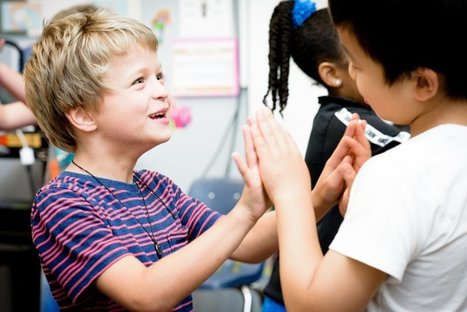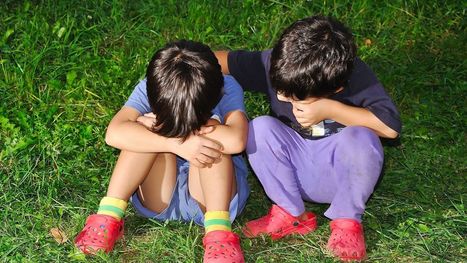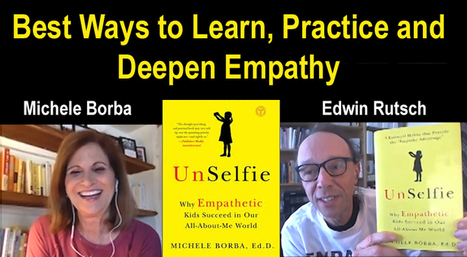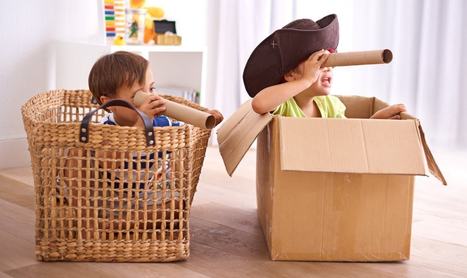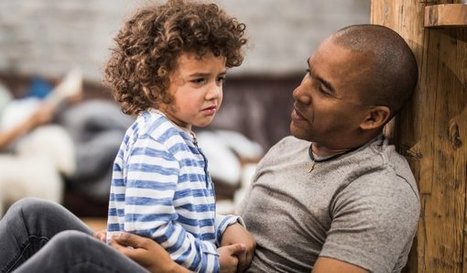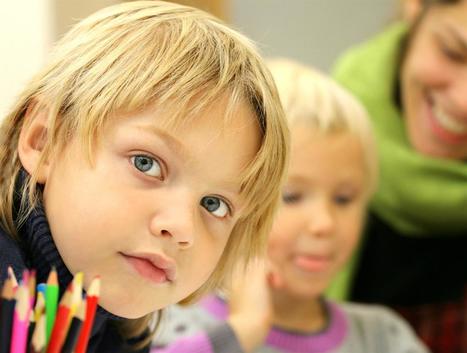 Your new post is loading...
 Your new post is loading...
Empathy is a key part of our social fabric. Numerous studies have tied empathetic behavior to success in the classroom and in life. Here are some ways area schools are focusing on empathy in their classrooms and school communities.
Encompassing both kinds of empathy
Lila Jokanovic, executive director at Council Oak Montessori School in Blue Island, explains that there is emotional empathy and cognitive empathy, and the school emphasizes the need for both.
“We place equal emphasis on being kind, which is emotional empathy, and being able to walk in the shoes of another and taking the perspective of another, which is cognitive empathy. This allows our students to develop into adults who are more likely to show compassion and lead as adults motivated to help others,” she says.
There are many good reasons to become a more empathic human being. First of all, consider your health: empathy can help you reduce stress. As reported by Andy Winder on goals.com, people who can empathize more easily have less “secondhand stress”—that is, less stress that is triggered by the behavior of others.
Morin indicates that empathy helps you forge social connections, and thus supports healthy relationships; it also helps you resolve conflicts by allowing a better understanding of the opposing party’s state of mind.
And it also provides information about the strength of your own feelings relative to those of the other people in your life, which may help you regulate your emotions by lending you some valuable perspective.
Because—as reported by Elizabeth Segal on Psychology Today—strong interpersonal relationships can enhance one’s sense of general well-being and increase life satisfaction, the relationship-supporting qualities of empathy play a role in promoting this general sense of wellness, too.
No matter how naturally empathetic your child is—and some children can appear quite impervious to others’ suffering—they can learn to see another’s perspective, and to respond appropriately to others’ emotions and behaviours.
Here are some ways you can help your child learn to be more empathetic: - Model how to value feelings. Show warmth, respect, and empathy towards your child and others. Acknowledge and value people’s feelings in your child’s presence (and elsewhere!). Be understanding and sympathetic when someone is sad, upset, distressed, or frustrated. Speak about others with kindness and respect, even when you think your child isn’t listening.
- Express your feelings openly....
- Support your child’s self-regulation skills....
- Acknowledge your child’s feelings. ...
- Encourage open dialogue....
- Point out the feelings of others. ...
- Connect feelings, thoughts, and behaviours. ...
- At the end of each day, ask your child about acts of kindness....
- Create a climate of empathy at home...
- Teach your child what happens when empathy fails. ...
- Expand your circle of concern...
Parents open up about how they're raising caring and empathetic children. “Having empathy for others is definitely a learned behavior. I started introducing it when my two children were both very young. They are one year apart and I knew I wanted to foster a lifelong friendship beyond brother and sister. Sharing toys: I would show them how happy it made the other one when they gave the toy to them. Understanding and verbally acknowledging feelings and talking about them. On the other hand, we learned boundaries and how to stop tickling each other when someone says stop.”
― Lindsay Brimmerman
When it comes to raising empathetic children, the advice to parents typically has to do with talking to them about the feelings of others, encouraging them to imagine how another person feels, and praising them when they display empathetic behavior.
But there’s one simple tool that gets left out of the conversation. I used it with my own kids, and, though I have yet to see this advice in any article about developing empathy, it lines up with current research and what we know about how humans interact with one another.
Why would it matter if infants displayed empathy? “Empathy is defined as the ability to understand the emotion of others, and share in those emotions, while maintaining a self-other distinction,” Florina Uzefovsky, of the Ben-Gurion University of the Negev, told us.'] “As can be understood from the definition, empathy is basic and central in all social communication. This ability allows us to interact with others, to better understand their motives and actions, and to engage in meaningful social relationships.”
Empathy is something easily taken for granted. Not everyone possesses or exhibits empathy and few actually exhibit the right amount of empathy. Empathy is a skill that is learned over time.
There are ways to help even the youngest children display greater empathy toward other children as well as adults. As their parent, you can:
Be an example. It’s easy to get caught up in this “do as I say, not as I do” mentality, but that doesn’t work well in creating empathy. Lead by example.
Be mindful of your child’s emotions. If we don’t respect our children’s emotions, how can we teach them to respect others?
Empathy is one of the vital steps towards cultivating humanity. Read on to learn the 5 ways you can teach empathy to your kids.
If you have been in a relationship for any length of time, you undoubtedly understand how fulfilling they can be; however, they require hard work, empathy, and commitment from both parties.
Communication and empathy are two great ways to strengthen a relationship. Why? These qualities allow you to have a deeper and more meaningful connection. Now that we have a general understanding of the importance of empathy in your relationship, let’s turn our attention towards steps that you can take towards becoming a more empathetic partner:
- 1. KEEPING THE LINE OF COMMUNICATION OPEN...
- 2. SEEING THINGS FROM THEIR PERSPECTIVE...
- 3. ASK QUESTIONS...
- 4. AVOID PASSING JUDGMENT...
- 5. DIVIDE THE WORKLOAD...
- 6. ACKNOWLEDGE THE WANTS AND NEEDS OF YOUR PARTNER...
- 7. SET ASIDE TIME TO BECOME A BETTER EMPATH...
- 8. BE “PRESENT” IN YOUR RELATIONSHIP...
Michele Borba, is an internationally renowned educational psychologist and an expert in parenting, bullying, and character development. She is an award-winning author of twenty-two books translated into fourteen languages.
One of the foremost authorities on childhood development in the country, she is a regular NBC contributor who appears regularly on Today and has been featured as an expert on Dateline, The View, Dr. Phil, NBC Nightly News, Fox & Friends, Dr. Oz, and The Early Show, among many others. She is author of, UnSelfie: Why Empathetic Kids Succeed in Our All-About-Me World.
"Empathy is the root of humanity and the foundation that helps our children become good, caring people. But the Empathy Advantage also gives them a huge edge at happiness and success."
When people are feeling happy, upset or even angry, we try to understand their feelings by putting ourselves in their shoes. Often, the other person's feelings can also inspire your sympathy. This is known as empathy. Empathy is an important quality which makes us less inclined to get into an argument or become aggressive and more inclined to help others. Dr Van der Graaff and her team are investigating the role that young people's relationships with their parents and peers play in these changes in empathy. They are also examining the relationship between boys' empathy skills and how well they function within their family, at school and in society.
How? Think about it this way. Each time your children “play pretend,” they have to imagine how another person would think and feel, and then act accordingly. Like striking the confident pose of a superhero, or forgetting how to walk and talk like a baby, or adopting an oh-so-fancy accent and extended pinky finger to have tea with the queen. Although acting may just seem like a fun game to your kids, it’s also giving them amazing practice at understanding people and developing empathy.
When a parent bestows the gift of empathy on a child, that visceral connection changes everything.
I see parents and children make breakthroughs every day. And guess what makes the most difference? Empathy. If we can actually see things from our child's perspective, everything changes.
This doesn't mean agreeing with our child, or letting him do whatever he wants just because we understand why he wants to. But it does mean that while our child doesn't get everything she wants, she gets something better: Someone who understands and accepts her, no matter what. It also means that once we understand our child's perspective, we can intervene to help her meet the needs that she was trying to meet all along, from connection to feeling valued.
|
6. Non-empathetic and neglectful parents
A child raised by controlling parents has no idea about the virtues of empathy, care, affection, and warmth.
Controlling parents fail to meet the emotional requirements of the child, like their need to be cared for, loved, considered and understood, even though they are often successful in providing the child with financial, academic and materialistic support.
Researchers believe empathy helps children unlock other skills they need for future success, such as critical thinking, effective collaboration, and problem solving. Learn more!
Empathy, according to author and psychologist, Thom Markham, is more than merely liking someone or being kind because you’re a good person. Empathy is the ability to “understand and share another person’s experiences and emotions.” To be truly empathetic requires that we are clear about our own motives, fears, and desires, we have the resilience and courage to feel negative emotions — our own and someone else’s, and we have had enough honest, authentic experiences to be able to relate to others. One of the most important things parents can do for children is help them develop empathy.
Empathy is declining in our children. Recently, researchers surveyed 10,000 middle- and high-school students—eighty per cent reported personal achievement was more important to them than caring for other people.
It’s neurologically impossible to be both stressed out, and really loving and kind at the same time.
What’s at the heart of this crisis in compassion? Too much screen time, for one. Stress is another factor. The hormone oxytocin, responsible for connecting and bonding us to our kids, giving us that warm, fuzzy feeling during caregiving—that hormone works on the same receptors in the brain as cortisol, the stress hormone. And therein lies the tension: It’s neurologically impossible to be both stressed out, and really loving and kind at the same time.
Overview of topics:
Why is empathy important?
Tip 1: Many interactions
Tip 2: Imitate babies
Tip 3: Explain the feelings of other people
Tip 4: Full power at school age
Tip 5: Talk about feelings
Tip 6: Demonstrate unprejudiced interest
Tip 7: Taking time consciously
Tip 8: Tell stories
Here are 5 Ways You Can Teach Empathy To Your Kids
1. Be Empathic To Them
One of the best ways to teach them empathy is to portray how you feel about them. If they are having hard times, give your attention and show them how you feel their pain. Parents usually tend to shove off the emotional aspect and address the issue from a third person’s point of view.
But in-order to raise an empath, you have to see things from their perspective and address their emotional state. Here, being empathic to them is as important as solving the issue, if not more. In this way, the child will notice how people are being empathic with them in their distress and will develop a compassion to show empathy to other people as they grow up.
2. Give Them The Opportunity To Be Empathic
Here are 5 Ways You Can Teach Empathy To Your Kids
1. Be Empathic To Them 2. Give Them The Opportunity To Be Empathic 3. Make Them Relate To Other People’s Pain 4. Spend More Time With Them 5. Encourage Them To Look To The Bright Side
"The findings indicate that even during a baby's first year, the infant is already sensitive to others' feelings and can draw complicated conclusions about the context of a particular emotional display," says Dr. Florina Uzefovsky, head of the BGU Bio-Empathy Lab, and senior lecturer in BGU's department of psychology and the Zlotowski Center for Neuroscience. "Even during the first year of life, babies are able to identify figures who "deserve" empathy and which ones do not, and if it appears that there is no justification for the other one's distress, no preference is shown."
Is this something only parents can do? I don’t think so. However, I believe empathy is best learned at home, around the people children spend the most time with.
1. Show Empathy Towards Your Child
Children learn by example, so if you want your children to behave a certain way, it is important to act as a mirror.
If you hope for your children to become empathetic, it is crucial that you treat situations with them, with empathy. Always be open to see things from your child’s perspective, and think of how they are feeling.
If your child seems upset, try getting to the root of the problem, making sure they feel heard and understood. If harsh words are used or they are treated poorly, always be sure to apologize.
Empathic parenting involves all of the above. To maintain a close bond with my children, it is essential for me to focus on being lovingly responsive in my interactions with them. - I want to relate well with them, sense what they are feeling, help them put their thoughts and feelings into words, and anticipate their reactions as well as their needs.
- I want to stop, get down to their level, look lovingly in their eyes, and give them my full attention. ''
- I need to listen, listen, listen, help them to feel understood, and accept them for the unique individuals they are.
- I must keep my own emotional world separate from theirs.
- I have to be flexible and willing to adjust my language, thoughts, and actions, and to admit my mistakes.
- Ineed to be able to step back and reflect on the events of the day, acknowledge the ways in which I offered my children unconditional support and love, and consider ways I might be able to maintain connection with greater ease.
My children rely on my ability to connect―and to re-connect―with them.They instinctively know that their coping abilities, and even their survival, depend on a strong connection with me. by Tamara Parnay
Denmark is one of the happiest countries in the world. This is according to the UN’s World Happiness Report, an important survey that since 2012 classifies the happiness of 155 countries in the world, and that for seven years has placed Denmark among the top three happiest countries on a global level. The fact that teaching empathy has been mandatory since 1993 in schools in Denmark is a factor that contributes to the happiness of the country.
Empathy helps build relationships, prevent bullying and succeed at work. It promotes the growth of leaders, entrepreneurs and managers. “Empathic teenagers” tend to be more successful because they are more oriented towards the goals compared to their more narcissistic peers.
Finding an empathic partner is a blessing in disguise. It feels great to fall in love with someone who appreciates you. Here are 5 benefits of being an empathic partner
1. Less frustration
An empathic partner will not stress you because of stupid things. You will feel loved and cared for. It feels great to date someone who rarely wants to hurt you in any way...
2. Better understanding... 3. Makes you feel listened to... 4. Experience great appreciation.. 5. Mutual trust... by Adonijah Nziwa
In our previous post, we shared with you some helpful posts on how you can be a catalyst of change in other people’s lives and passing this on to your children. Empathy is such a life-giving character that our Charity Organization in Indianapolis, Indiana strives to practice this virtue in every opportunity presented to us.
Thankfully, your role as a parent can be a great contribution in the way your child develops towards an empathic person. Hereon, let’s share with you some more tips on how you can influence your little one to this empowering virtue.
|

 Your new post is loading...
Your new post is loading...
 Your new post is loading...
Your new post is loading...



